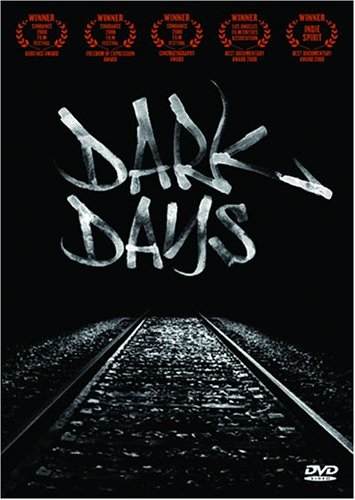Here's an extract from the Wikipedia entry for the film we're watching this evening.
"Dark Days" (2000) is a documentary made by Marc Singer, a British filmmaker. The film follows a group of people living in an abandoned section of the New York City underground railway system, more precisely the area of the so called Freedom Tunnel.
When he relocated from London to Manhattan, Marc Singer was struck by the number of homeless people he had seen throughout the city. Singer had befriended a good number of New York's homeless and later, after hearing of people living underground in abandoned tunnel systems, he met and became close to a group of people living in The Freedom Tunnel community stretching north from Penn Station past Harlem. After living with them for a number of months, he decided to create a documentary in order to help them financially. Singer had never been a filmmaker before, and saw the production of Dark Days as a means of gaining better accommodation for the residents of the tunnel.
The film's crew consisted of the subjects themselves, who rigged up makeshift lighting and steadicam dollies, and learned to use a 16mm camera with black-and-white Kodak film. The post-production process took years, as financial difficulties created delays, as did Singer's insistence of creative control to protect the tunnel residents.
During filming, Amtrak announced they would be forcibly evicting the homeless living in the tunnels. This announcement, plus the police presence backing the decision, prompted Singer and photographer Margaret Morton to go to the Coalition for the Homeless for help. Eventually, Singer and Morton managed to secure housing vouchers from the Department of Housing and Urban Development for the film's subjects, which enabled them to move out of the tunnels and into their own apartments.
The film features music by DJ Shadow, including excerpts from Endtroducing... as well as his album with U.N.K.L.E. Melissa Neidich was the editor of the film. Cinevision, a New York City camera shop, supplied Singer with cameras for the two-and-a-half years of filming. When Singer ran out of money for film, Kodak supplied free damaged film for the project.
Dark Days was released in 2000, and was nominated for several film festival awards. The film won many of these, including the Independent Spirit Award for Best Documentary Feature, Best Documentary/Non-fiction film at the Los Angeles Film Critics Association Awards, Senior Programmer's Pick at the SXSW Film Festival Awards, and three Sundance Film Festival awards in 2000: the Audience Award for best documentary, the cinematography award for documentary, and the Freedom of Expression Award.
After the film, we have a relatively structured discussion of some of the most striking points of the film in the screening room, for half an hour or so, then adjourn to the Screen Lounge Cafe to continue discussion in a more sociable environment. I get the chance to talk about what might be termed some of the more spiritual dimensions of the film with a small group of film-makers amongst our group.
Find out more about Phoenix Square Digital Film & Media Centre:
http://www.phoenix.org.uk/index.php?cms_id=21
Visit the Facebook page of the Leicester Documentary Club:
http://www.facebook.com/home.php?#!/group.php?gid=104523019580511&ref=ts

Thanks for coming along George and glad you liked it. It's a chance to have a discussion with people about important issues so spread the word! See you at the next one. Regards John Coster
ReplyDelete